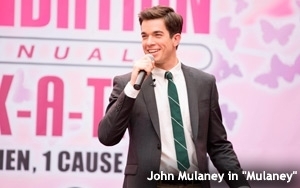
Here’s a good example of the pitfalls of TV-column writing: I was all ready to blast this new Fox comedy series “Mulaney” as one of the worst shows I had the misfortune to waste
time watching this past summer.
But then, almost by happenstance, I decided to watch the series premiere I received recently from Fox on a DVD before writing today’s TV blog. And guess what:
The pilot that Fox is airing this coming Sunday night at 9:30 (8:30 central) is completely different from the episode that Fox provided to TV columnists last summer (back in July, if memory
serves).
That earlier episode formed the basis for my original assessment of this show. Among the notes I wrote back when I watched that one:
“Incredible -- I’m watching a
TV show in which Martin Short is not funny, something that would seem to be impossible to achieve and yet, the makers of ‘Mulaney’ achieved this.”
advertisement
advertisement
And: “I have just
come across the most off-putting character seen on any of the new fall TV shows: This show’s ‘Kramer’ -- the flamboyant, older gay neighbor who lives across the hall, played by
Elliott Gould. Horrendous.”
It wouldn’t have been fair to base this column on that previous episode because, in this Sunday’s pilot, Martin Short IS funny. And the
Elliott Gould character was much easier to take, and it seems to me, given less to do, which is probably a good thing.
If you haven’t yet heard of this show, “Mulaney” is a
sitcom about a standup comedian who lives in New York. It is based on the comedy of 32-year-old comedian John Mulaney. With a title consisting solely of this comedian’s last name, Fox seems
determined to position “Mulaney” as a modern-day “Seinfeld.” The pilot even begins with a scene of Mulaney doing his standup act, just like the earlier episodes of
“Seinfeld.”
The parallels with “Seinfeld” are both a blessing and a curse -- particularly the latter because when watching “Mulaney,” you might find
yourself keeping a distracting mental inventory of “Seinfeld” similarities -- or at least I did.
Among them: The show has an Elaine -- a high-strung apartment-mate played by Nasim
Pedrad, formerly of “Saturday Night Live” (where, I just learned on Wikipedia, Mulaney was a writer). There’s kind of a “George,” a male friend (and also an
apartment-mate) named Motif. Unlike George Costanza, Motif (played by Seaton Smith) is African-American and also a comedian. And there’s the aforementioned neighbor, Oscar the older gay man, who
lives across the hall and may or may not emerge as this show’s Kramer.
Unlike “Seinfeld,” the comedian character in “Mulaney” has a job, or at least he seeks one
and gets one in the pilot episode -- as a writer for a comedian/entertainer who hosts a TV game show called “Celebrity You Guessed It.” This personality’s name is Lou Cannon and
he’s the character played by Short.
There’s also a bearded chubby fellow named Andre who seems to be this show’s pot dealer -- a character “Seinfeld” didn’t
have and probably would never have considered having. It’s possible that this Andre character will turn out to be this show’s Newman, but that’s difficult to determine so
far.
In the pilot episode airing this Sunday, the Pedrad character -- “Jane” -- surpasses Oscar the gay neighbor as the worst character on the show. She’s a hand-wringing,
shrieking nutjob who bursts so forcefully and loudly into her scenes that you’re tempted to place an index finger in each ear to muffle the sound of her.
You might think there’s no
benefit to positioning a TV show as a new “Seinfeld,” because then the show would be doomed to come out on the short end of the inevitable comparisons. But even while inventorying this
show’s shortcomings, I came to the conclusion when it was over that it wasn’t bad. It’s just not fully formed -- which was the same way “Seinfeld” was back in its
earliest days and then, by some miracle, survived to become the most popular TV comedy series of all time.
Just to be clear, I am not implying that “Mulaney” is headed in that same
direction. I’m a TV critic, not a fortuneteller (my record of predictions where the future success or failure of TV shows is concerned is, at best, inconsistent).
But based on this
Sunday’s pilot, I am at least comfortable with declaring that “Mulaney” now has some hope of surviving, instead of no hope at all.